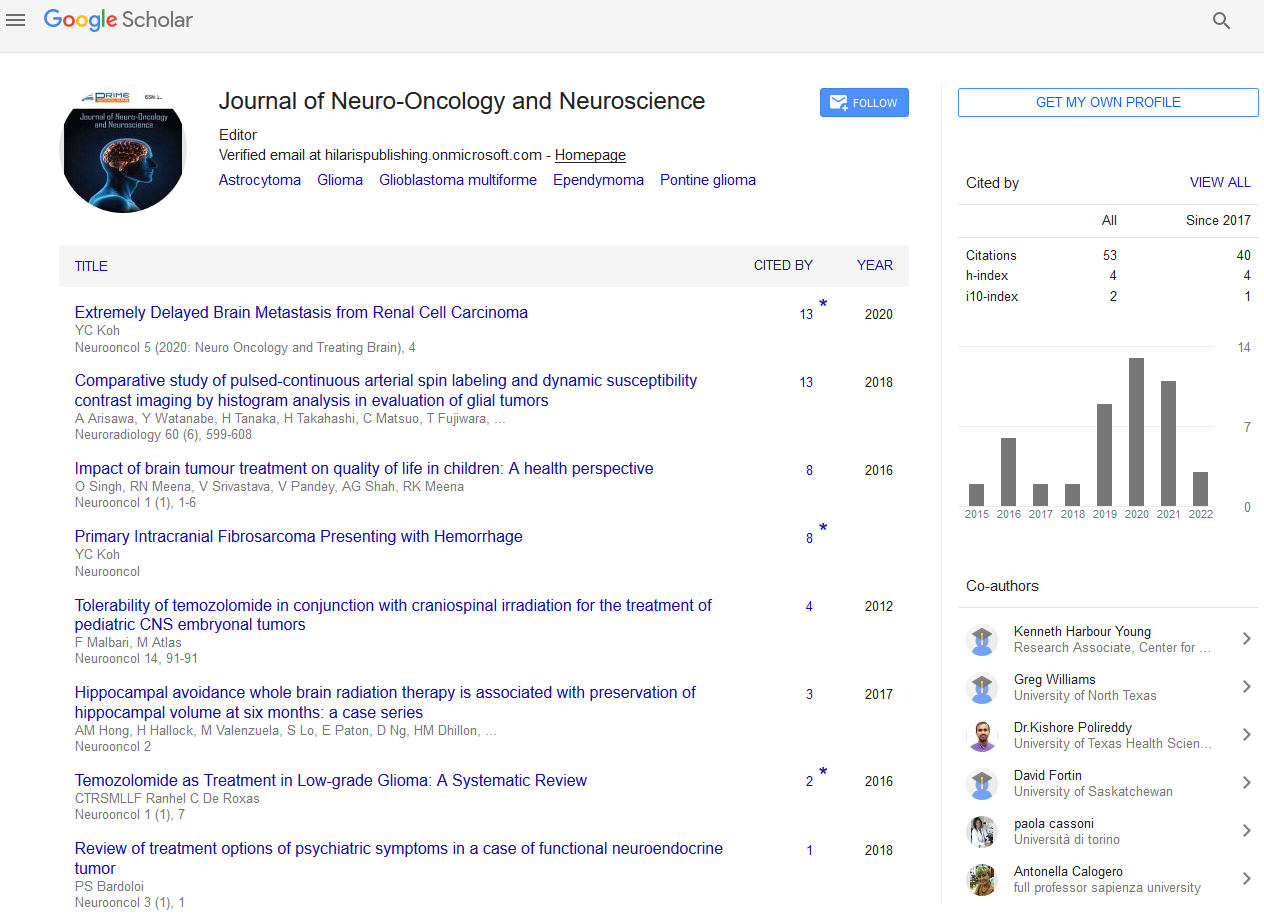Perspective - (2024) Volume 9, Issue 3
Quality of Life Assessments in Neuro-Oncology Clinical Trials
Tabuchi Antonio*
Department of Neuro Oncology, University of Pennsylvania, USA
*Correspondence:
Tabuchi Antonio,
Department of Neuro Oncology, University of Pennsylvania,
USA,
Email:
Received: 02-Sep-2024, Manuscript No. IPJNO-24-21304;
Editor assigned: 04-Sep-2024, Pre QC No. IPJNO-24-21304 (PQ);
Reviewed: 18-Sep-2024, QC No. IPJNO-24-21304;
Revised: 23-Sep-2024, Manuscript No. IPJNO-24-21304 (R);
Published:
30-Sep-2024, DOI: 10.21767/2572-0376.9.3.27
Introduction
The field of neuro-oncology, which deals with tumors of the
nervous system, has witnessed significant advancements in
diagnostic and therapeutic strategies over the past few decades.
While the primary focus has traditionally been on prolonging
survival, there is a growing recognition of the importance of
quality of life assessments in clinical trials. These assessments
provide a comprehensive understanding of how treatments
impact patients’ physical, emotional, and social well-being,
offering invaluable insights that extend beyond mere survival
statistics. Patients with brain tumors often face a multitude
of challenges, including neurological deficits, cognitive
impairments, and emotional disturbances. These challenges
can stem from the tumor itself or as side effects of treatments
like surgery, radiation, and chemotherapy. Understanding the
broader impact of treatments helps clinicians provide care that
addresses not just the disease but the patient’s overall wellbeing.
Description
QoL data empower patients and clinicians to make treatment
decisions that align with the patient’s values and preferences.
Incorporating QoL assessments allows for a more nuanced
evaluation of therapeutic interventions, balancing efficacy
with tolerability. The European Organisation for Research and
Treatment of Cancer Quality of Life Questionnaire-Core 30 is
a widely used instrument that assesses general cancer-related
QoL. The Brain Cancer Module complements it by focusing on
symptoms specific to brain tumors, such as visual disturbances
and motor dysfunction. Functional Assessment of Cancer
Therapy-brain This tool evaluates general QoL aspects and
includes brain-specific concerns, offering a comprehensive
overview of the patient’s condition. MD Anderson Symptom
Inventory-Brain Tumor Module Focused primarily on symptom
burden, this instrument helps in understanding how symptoms
interfere with daily activities. Determining when and how often
to administer QoL assessments is crucial. Frequent assessments
can provide detailed insights but may burden patients,
especially those with cognitive impairments. Balancing the
need for data with patient comfort is essential. Analyzing
QoL data requires expertise to distinguish between clinically
meaningful changes and statistical variations. Establishing
baseline measurements and understanding the natural
progression of symptoms are vital for accurate interpretation.
Ensuring that patients complete QoL assessments reliably is a
challenge, particularly when dealing with debilitating diseases.
Simplifying questionnaires and providing support can enhance
compliance. QoL perceptions can vary across cultures. Selecting
or adapting instruments that are culturally sensitive ensures
that the data collected are valid and relevant. Understanding
the QoL implications of treatment doses can guide clinicians
in tailoring therapies to minimize adverse effects. QoL data
can highlight areas where supportive care is needed, such as
managing fatigue, cognitive rehabilitation, or psychological
support. There’s a need for consensus on the best instruments
and methodologies to use, ensuring consistency across studies.
Capturing long-term QoL data can be challenging due to
patient attrition and resource constraints. Innovative methods,
such as digital platforms, could facilitate extended follow-up.
Combining QoL data with biological markers could provide a
more comprehensive understanding of treatment impacts.
Engaging patients in the design and implementation of QoL
assessments ensures that the instruments used are relevant
and meaningful to their experiences.
Conclusion
Quality of life assessments are integral to neuro-oncology
clinical trials, providing insights that extend beyond traditional
clinical endpoints. By capturing the multifaceted experiences
of patients, these assessments inform treatment decisions,
guide supportive care, and ultimately aim to improve the
holistic well-being of individuals battling brain tumors. As the
field advances, continued emphasis on QoL, alongside survival
metrics, will ensure that patient-centered care remains at the
forefront of neuro-oncological research and practice.
Citation: Antonio T (2024) Quality of Life Assessments in Neuro-oncology Clinical Trials. Neurooncol. 9:27.
Copyright: © 2024 Antonio T. This is an open-access article distributed under the terms of the Creative Commons Attribution License, which permits unrestricted use, distribution, and reproduction in any medium, provided the original author and source are credited.

